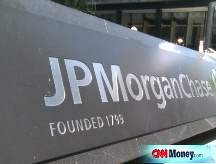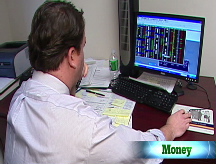Another bad day for the Dow
Blue-chip measure down for 6th straight day as investors lament weak retail sales and dismal banking news.
NEW YORK (CNNMoney.com) -- Stocks slumped Wednesday afternoon as a bleak retail sales report and more dour news from the banking sector amplified fears of a prolonged recession.
After the close, Apple (AAPL, Fortune 500) CEO Steve Jobs said he's taking a medical leave through the end of the second quarter because his health-related issues are "more complex" than he thought. Shares tumbled 10% in after-hours trading after having been halted for the first hour of the extended session.
The Dow Jones industrial average (INDU) lost 250 points, or 2.9%, ending at its lowest point since Dec. 1. The Dow has now tumbled for six sessions in a row.
The Standard & Poor's 500 (SPX) index lost 3.4% and ended at the lowest point since Dec. 1. The Nasdaq composite (COMP) lost 3.7% and closed at its lowest point since Dec. 4.
Wednesday's decline extends the 2009 selloff. Stocks have slipped through much of the first two weeks of the year as worse-than-expected economic and corporate news has caused investors to question the year-end rally.
"There's a sense of 'Wow. We knew it was bad, but not this bad,'" said Drew Kanaly, chairman and CEO at Kanaly Trust Company.
He said that no one is surprised by the downturn, but rather the scope and speed of it. "I think it's caught people a little off guard, how fast the economic conditions have started to deteriorate."
In particular, investors were reacting Wednesday to the weakness in the banking sector, said Steven Goldman, market strategist at Weeden & Co.
Deutsche Bank reported a huge quarterly loss, HSBC may need to raise billions in capital and JPMorgan Chase's results are looming. Investors are also taking a sour reaction to news that Citigroup is selling a majority stake in its brokerage unit to Morgan Stanley, a move that would seem to indicate the beginning of the break-up of the troubled banking firm.
"Citigroup selling their crown jewels in a bad environment is definitely contributing to the selling over the last week," Goldman said.
Between the bear market lows of Nov. 20 and the end of the first session of 2009, the S&P 500 rallied nearly 24%. Since then, the S&P 500 has lost 9.6% and looks to be headed for more declines in the short term.
But the financial sector has fared far worse. Between Nov. 20 and the first session of the year, the KBW Bank index gained over 23%, roughly comparable to the S&P 500. Since then, it has lost almost 21%, far surpassing the broad market's decline. (Full story)
The CBOE Volatility (VIX) index, or the VIX, has been rising over the last few sessions, suggesting investors are getting more jittery. The VIX jumped 13% to 49.14 in Wednesday trading. However, the VIX remains well below historic highs near 90, which it hit in November when the stock market bottomed.
Thursday's market: Thursday brings the weekly jobless claims report, two regional manufacturing reports and the producer price index (PPI) - a measure of wholesale inflation.
JPMorgan Chase (JPM, Fortune 500) reports results Thursday. In an interview with the Financial Times, the company's chief executive Jamie Dimon said the U.S. economy and the financial sector will worsen this year.
Motorola (MOT, Fortune 500) is also likely to be active Thursday. The telecom said after the close that it will cut 4,000 jobs on top of the 3,000 job cuts it already announced in late 2008.
Investors are again pulling money out of equity mutual funds, after a brief period in December of adding money to funds. For the week ended Wed. Jan. 14, investors pulled $6 billion out of stock funds, according to Trim Tabs. In the previous week, investors had poured $13.4 billion into funds.
Financials: Late Tuesday, Citigroup (C, Fortune 500) said it is selling 51% of its Smith Barney brokerage unit to Morgan Stanley (MS, Fortune 500) for $2.7 billion in much-needed cash. Citi stock plunged 23% Wednesday, while Morgan Stanley fell nearly 9%.
Citi has now moved up its quarterly results from next week to this Friday.
In other news, Germany's Deutsche Bank (DB) said it would post a steep fourth-quarter loss Wednesday of $6.4 billion. And Morgan Stanley said that HSBC (HBC), Europe's largest bank, will probably need to cut its dividend in half and may need to raise up to $30 billion in capital.
In other company news: Nortel Networks (NT), North America's largest telecom gear maker, filed for bankruptcy protection.
Market breadth was negative. On the New York Stock Exchange, winners beat losers by more than nine to one on volume of 1.08 billion shares. On the Nasdaq, decliners topped advancers by over four to one on volume of 1.98 billion shares.
Retail: Retail sales slumped 2.7% in December, the Commerce Department reported Wednesday morning. That was more than twice what economists were forecasting, as the recession took its toll on consumer spending in the critical holiday sales period. Sales fell 2.1% in the previous month.
Sales excluding volatile autos fell 3.1% versus forecasts for a drop of 1.4%. Sales excluding autos fell 2.5% in November.
Meanwhile, the retail industry's leading trade group said 2008 holiday sales fell 2.8% versus a year earlier, due to the recession and fewer shopping days. That surpassed the initial forecast for a drop of 2.2% in the combined November-December period.
In other retail sector news, regional department store chain Gottschalks has filed for bankruptcy protection. Clothing chain Goody's said it will liquidate its remaining 282 stores.
Economy: Investors got another dose of bad news with the afternoon release of the Federal Reserve's Beige Book reading on the economy. The Beige Book showed erosion over the last six weeks in nearly all of the nation's 12 districts.
In addition to the Beige Book and retail sales index, a morning report from the government showed that business inventories fell 0.7% in November after falling 0.6% in the previous month. Inventories were expected to fall 0.5% in the month, according to Briefing.com forecasts.
Bonds: Treasury prices rallied, lowering the yield on the benchmark 10-year note to 2.20% from 2.29% Tuesday. Treasury prices and yields move in opposite directions. Yields on the 2-year, 10-year and 30-year Treasurys all hit record lows last month.
Lending rates improved. The 3-month Libor rate fell to 1.08% from 1.09% Tuesday, according to the British Banker's Association, marking a 5-1/2 year low. Overnight Libor held steady at 0.10%, a record low. Libor is a key bank lending rate.
Other markets: In global trading, Asian markets ended higher, and European markets ended lower.
The dollar gained versus the euro and fell against the yen.
U.S. light crude oil for February delivery fell 50 cents to settle at $37.28 a barrel on the New York Mercantile Exchange, erasing earlier losses following the release of the government's weekly oil inventories report.
COMEX gold for February delivery fell $11.90 to settle at $808.80 an ounce.
Gasoline prices rose two-tenths of a cent to a national average of $1.792 a gallon, according to a survey of credit-card swipes released Wednesday by motorist group AAA.
How do you think Barack Obama's presidency will affect you and your wallet? What can he do to help you - and others - in these trying economic times? E-mail us at realstories@cnnmoney.com, and your thoughts could be part of an upcoming story. ![]()




